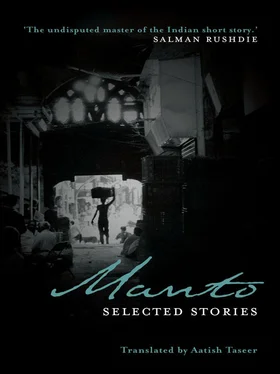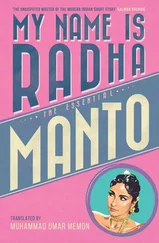The reply came: ‘They just can’t. Your licence is revoked.’
Nesti said, ‘Sir, then take my horse and coach as well, but please tell me why women can’t drive coaches. Women can grind mills and fill their stomachs. Women can carry rubble in baskets on their heads and make a living. Women can work in mines, sifting through pieces of coal to earn their daily bread. Why can’t I drive a coach? I know nothing else. The horse and carriage were my husband’s, why can’t I use them? How will I make ends meet? My Lord, please have mercy. Why do you stop me from hard, honest labour? What am I to do? Tell me.’
The officer replied: ‘Go to the bazaar and find yourself a spot. You’re sure to make more that way.’
Hearing this, the real Nesti, the person within, was reduced to ashes. ‘Yes sir,’ she answered softly and left. She sold the horse and carriage for whatever she could get and went straight to Abu’s grave. For a moment, she stood next to it in silence. Her eyes were completely dry, like the blaze after a shower, robbing the earth of all its moisture. Her lips parted and she addressed the grave: ‘Abu, your Nesti died today in the committee office.’
With this, she went away. The next day she submitted her application. She was given a licence to sell her body.
Salima was twenty one when she was married. And though five years had passed, she had not had a child. Her mother and mother-in-law were very worried. Her mother, more so, for fear that her husband, Najib, would marry again. Many doctors were consulted, but none were of any help.
Salima was anxious too. Few girls do not desire a child after marriage. She consulted her mother and acted on her instructions, but to no avail.
One day a friend of hers came to see her. She had been declared barren and so Salima was surprised to see that she held a flower of a boy. ‘Fatima,’ she asked indelicately, ‘how did you produce this boy?’
Fatima was five years older than Salima. She smiled and said, ‘This is the benevolence of Shah Daulah. A woman told me that if I wanted children, I should go to the shrine of Shah Daulah in Gujarat and make my entreaty. Say, “Hazur, the first child born to me, I will offer up in your service.” ’ This child would be born with a very small head, she told Salima. Salima didn’t like this. And when Fatima insisted that this firstborn child had to be left in the service of the shrine, she was sadder still. She thought, what mother would deprive herself of her child forever? Only a monster could abandon its child, whether his head be small, his nose flat or his eyes crossed. But Salima wanted a child badly and so she heeded her older friend’s advice.
She was, in any case, native to Gujarat where Shah Daulah’s shrine was. So she said to her husband, ‘Fatima’s insisting I go with her. Would you give me permission?’ What objection could her husband have? He said, ‘Go, but come back quickly.’ Salima went off with Fatima.
Shah Daulah’s shrine was not, as she had thought, some old, decrepit building. It was a decent place which she liked well enough. But when in one chamber, she saw Shah Daulah’s ‘mice’, with their running noses and their minds enfeebled, she began to tremble. There was a young girl, in the prime of her youth, whose antics were such that she could reduce the most serious of serious people to laughter. Watching her, Salima laughed to herself for an instant. Then immediately her eyes filled with tears. What will become of this girl, she thought. The shrine’s caretakers will sell her to somebody who’ll take her from town to town like a performing monkey; the wretch, she’ll become somebody’s source of income. Her head was very small. But Salima thought, even if her head is small, her heart can’t be similarly small; that remains the same, even in madmen.
The Shah Daulah’s mouse had a beautiful body, rounded and proportionate in every way. But her antics were those of one whose faculties had been decimated. Seeing her wander about, laughing like a wind-up doll, Salima felt as if she’d been made for this purpose.
And yet, despite her misgivings, Salima followed her friend Fatima’s advice and prayed at Shah Daulah’s shrine, swearing that if she had a child, she would hand him over.
Salima continued her medical treatment as well. After two months, she showed signs of pregnancy. She was thrilled. A boy was soon born to her, a beautiful boy. There had been a lunar eclipse during her pregnancy, and he was born with a small, not unattractive, mark on his right cheek.
Fatima came to visit and said that the boy should be handed over at once to Shah Daulah saab. Salima herself had accepted this, but she had been delaying it for many days; the mother in her wouldn’t allow her to go through with it; she felt as though a part of her heart was being cut out.
She had been told that the firstborn of those who asked a child of Shah Daulah would have a small head. But her son’s head was quite big. Fatima said, ‘This is not something you can use as an excuse. This child of yours is Shah Daulah’s property. You have no right over him. If you stray from your promise, remember that a scourge will befall you, the likes of which you won’t forget for a lifetime.’
So, with her heart breaking, Salima went back to Gujarat, to the shrine of Shah Daulah, and handed to its caretakers, her beloved flower of a son, with the black mark on his right cheek.
She wept. Her grief was so great she became sick. For a year, she hovered between life and death. She couldn’t forget her boy nor the pleasing mark on his right cheek, which she had so often kissed.
She had strange dreams. Shah Daulah, in her distressed imagination, became a large mouse gnawing, with its razor edged teeth, at her flesh. She would shriek and implore her husband to help her. ‘Look, he’s eating my flesh!’ she would cry.
Sometimes her fevered mind would see her son entering a mouse hole. She would be holding onto his tail, but the bigger mice had him by the snout and she couldn’t pull him out.
Sometimes the girl whom she’d seen in a chamber of Shah Daulah’s shrine, the girl in the flower of her youth, would appear before her, and Salima would let out a laugh. Then a moment later, she would begin to cry. She would cry so much that her husband wouldn’t know how to quell her tears.
Salima saw mice everywhere, in bed, in the kitchen, in the bathroom, on the sofa, in her heart. Sometimes she felt she herself was a mouse: her nose was running, she was in a chamber of Shah Daulah’s shrine, carrying her tiny head on her weak shoulders, and her antics made onlookers fall over themselves with laughter. Her condition was pitiable.
Her world had been marked, like a face on which the fragments of a dead sun had become stuck.
The fever subsided, and Salima’s condition stabilised. Najib was relieved. He knew the cause of his wife’s illness, but he was in the grip of superstition himself and hardly conscious that he had offered up his firstborn as a sacrifice. Whatever had been done seemed right to him; in fact, he felt that the son that had been born to him was not even his, but Shah Daulah saab’s. When Salima’s fever, along with the storm in her mind and soul, cooled, Najib said to her, ‘My darling, you must forget your son. He was meant for sacrifice.’
Salima replied in a wounded voice, ‘I don’t believe in any of it. All my life I will curse myself for committing so great a wrong and handing over a piece of my heart to those caretakers. They cannot be its mother.’
One day, Salima disappeared to Gujarat and spent eight or nine days there, making enquiries about her son, but learnt nothing of his whereabouts. She returned, depressed, and said to her husband, ‘Now I won’t remember him any longer.’
Читать дальше












